Catholic Social Teaching | Report
VerifiedAdded on 2022/09/15
|9
|1597
|14
AI Summary
Contribute Materials
Your contribution can guide someone’s learning journey. Share your
documents today.
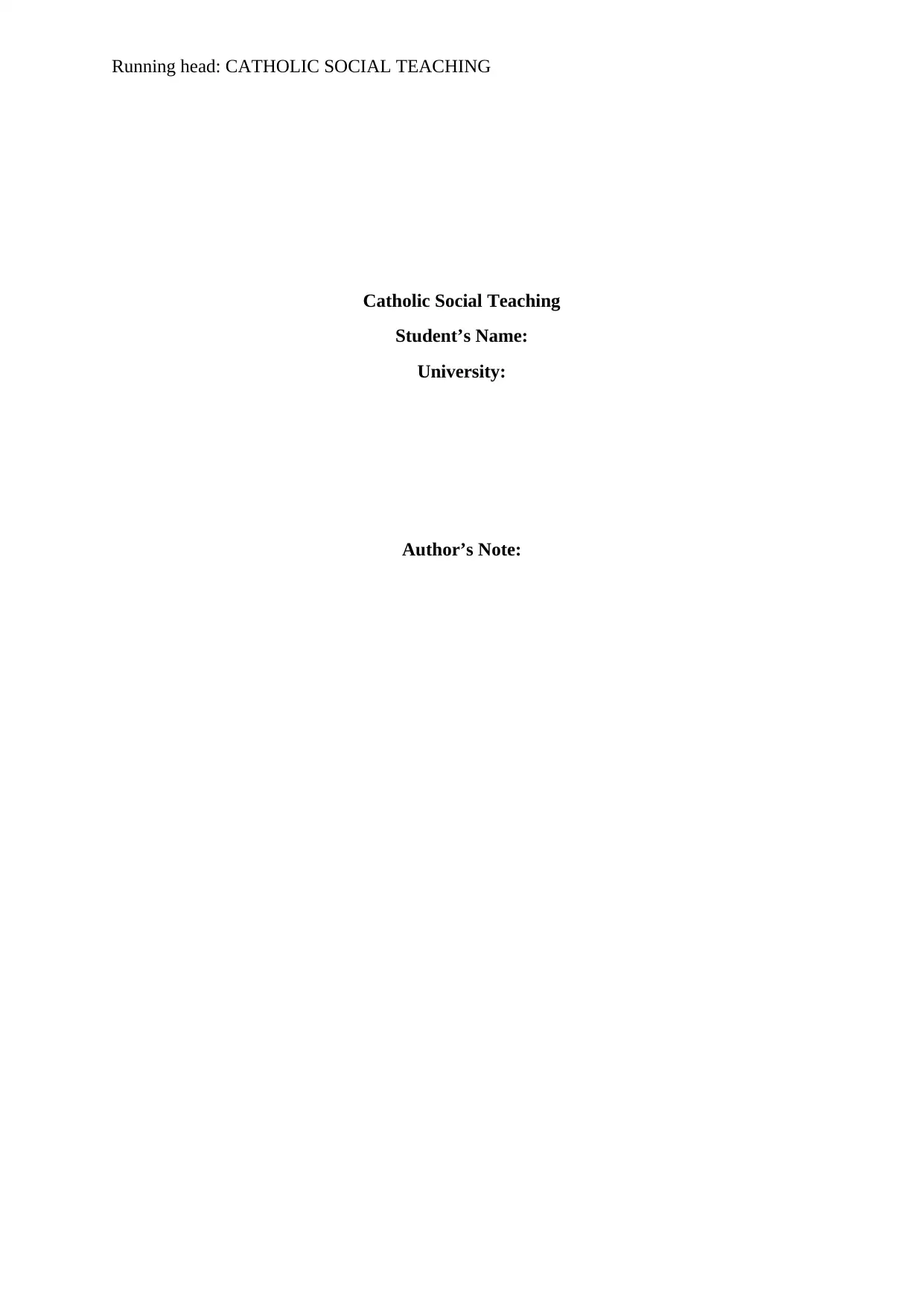
Running head: CATHOLIC SOCIAL TEACHING
Catholic Social Teaching
Student’s Name:
University:
Author’s Note:
Catholic Social Teaching
Student’s Name:
University:
Author’s Note:
Secure Best Marks with AI Grader
Need help grading? Try our AI Grader for instant feedback on your assignments.

1
CATHOLIC SOCIAL TEACHING
Executive summary:
The following paper is a feature article on Catholic Social Teachings. The aim of this article
is to critically examine the relation of the CSTs with the concept of self and community. The
article describes the general notion of the CSTs followed by the notions of self and
community. Further, it describes the relation between self and community and links it with
three basic principles of the CSTs. In conclusion, it elucidates the importance of this
interconnectedness with examples from vocational experience.
CATHOLIC SOCIAL TEACHING
Executive summary:
The following paper is a feature article on Catholic Social Teachings. The aim of this article
is to critically examine the relation of the CSTs with the concept of self and community. The
article describes the general notion of the CSTs followed by the notions of self and
community. Further, it describes the relation between self and community and links it with
three basic principles of the CSTs. In conclusion, it elucidates the importance of this
interconnectedness with examples from vocational experience.
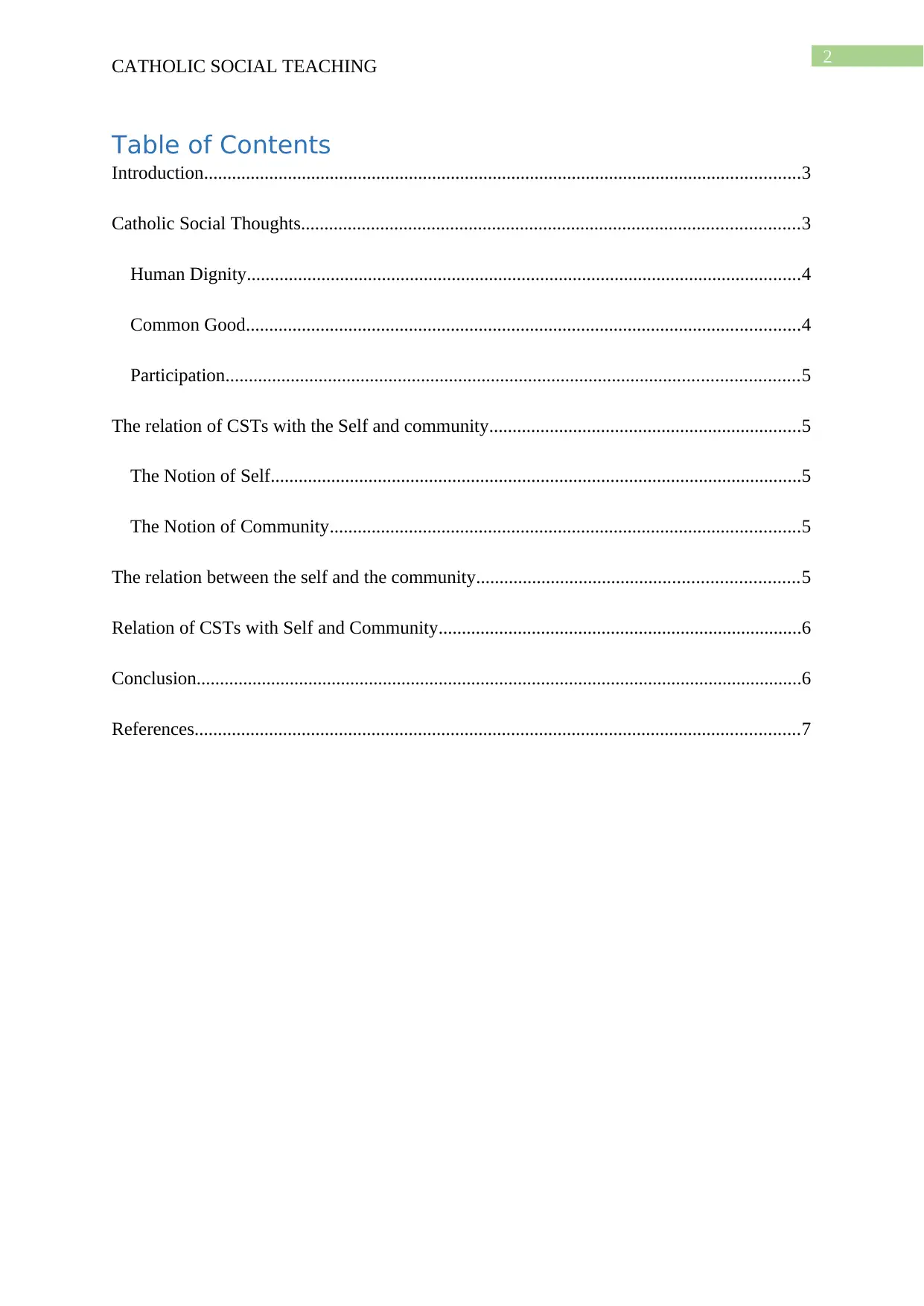
2
CATHOLIC SOCIAL TEACHING
Table of Contents
Introduction................................................................................................................................3
Catholic Social Thoughts...........................................................................................................3
Human Dignity.......................................................................................................................4
Common Good.......................................................................................................................4
Participation...........................................................................................................................5
The relation of CSTs with the Self and community...................................................................5
The Notion of Self..................................................................................................................5
The Notion of Community.....................................................................................................5
The relation between the self and the community.....................................................................5
Relation of CSTs with Self and Community..............................................................................6
Conclusion..................................................................................................................................6
References..................................................................................................................................7
CATHOLIC SOCIAL TEACHING
Table of Contents
Introduction................................................................................................................................3
Catholic Social Thoughts...........................................................................................................3
Human Dignity.......................................................................................................................4
Common Good.......................................................................................................................4
Participation...........................................................................................................................5
The relation of CSTs with the Self and community...................................................................5
The Notion of Self..................................................................................................................5
The Notion of Community.....................................................................................................5
The relation between the self and the community.....................................................................5
Relation of CSTs with Self and Community..............................................................................6
Conclusion..................................................................................................................................6
References..................................................................................................................................7
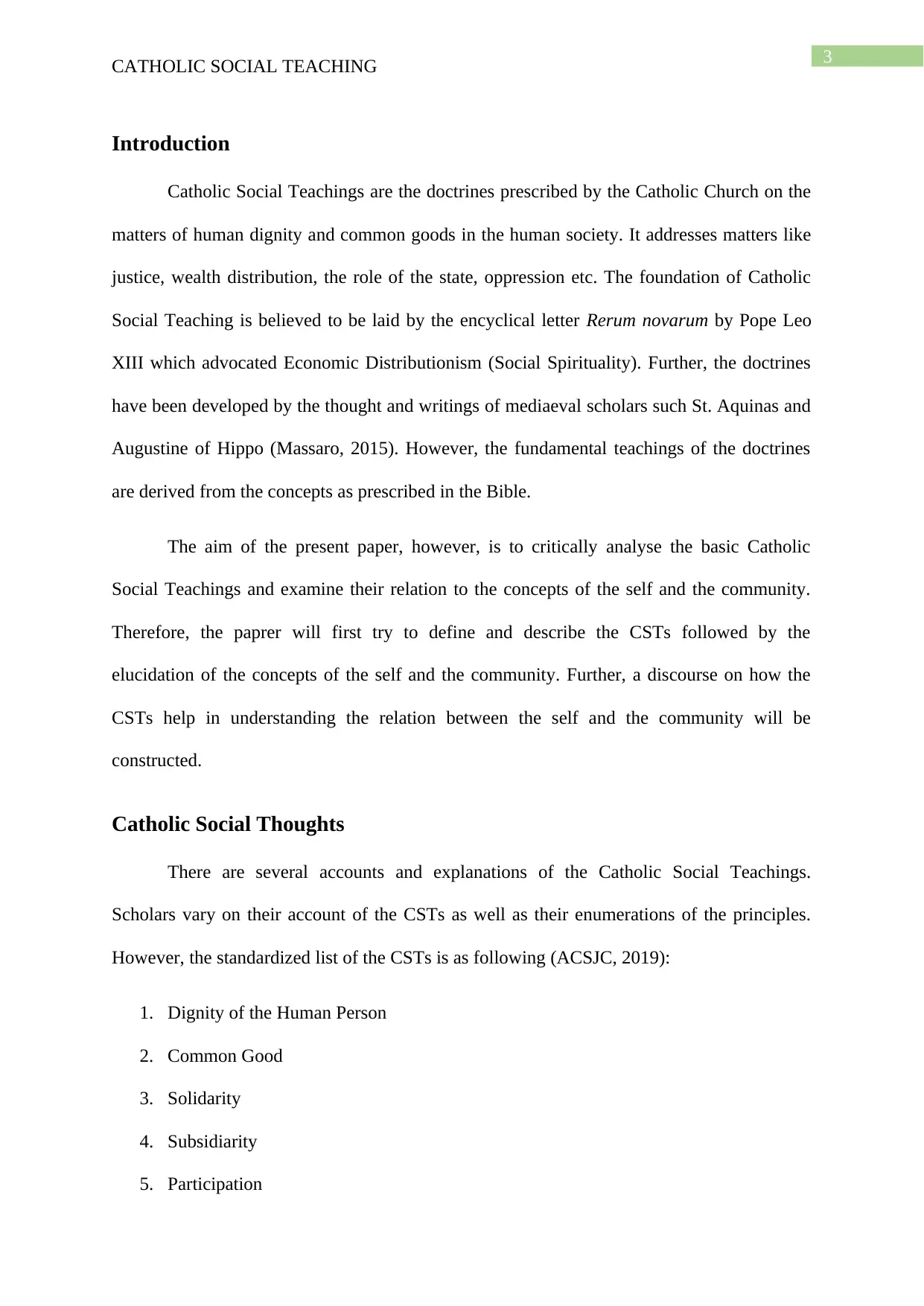
3
CATHOLIC SOCIAL TEACHING
Introduction
Catholic Social Teachings are the doctrines prescribed by the Catholic Church on the
matters of human dignity and common goods in the human society. It addresses matters like
justice, wealth distribution, the role of the state, oppression etc. The foundation of Catholic
Social Teaching is believed to be laid by the encyclical letter Rerum novarum by Pope Leo
XIII which advocated Economic Distributionism (Social Spirituality). Further, the doctrines
have been developed by the thought and writings of mediaeval scholars such St. Aquinas and
Augustine of Hippo (Massaro, 2015). However, the fundamental teachings of the doctrines
are derived from the concepts as prescribed in the Bible.
The aim of the present paper, however, is to critically analyse the basic Catholic
Social Teachings and examine their relation to the concepts of the self and the community.
Therefore, the paprer will first try to define and describe the CSTs followed by the
elucidation of the concepts of the self and the community. Further, a discourse on how the
CSTs help in understanding the relation between the self and the community will be
constructed.
Catholic Social Thoughts
There are several accounts and explanations of the Catholic Social Teachings.
Scholars vary on their account of the CSTs as well as their enumerations of the principles.
However, the standardized list of the CSTs is as following (ACSJC, 2019):
1. Dignity of the Human Person
2. Common Good
3. Solidarity
4. Subsidiarity
5. Participation
CATHOLIC SOCIAL TEACHING
Introduction
Catholic Social Teachings are the doctrines prescribed by the Catholic Church on the
matters of human dignity and common goods in the human society. It addresses matters like
justice, wealth distribution, the role of the state, oppression etc. The foundation of Catholic
Social Teaching is believed to be laid by the encyclical letter Rerum novarum by Pope Leo
XIII which advocated Economic Distributionism (Social Spirituality). Further, the doctrines
have been developed by the thought and writings of mediaeval scholars such St. Aquinas and
Augustine of Hippo (Massaro, 2015). However, the fundamental teachings of the doctrines
are derived from the concepts as prescribed in the Bible.
The aim of the present paper, however, is to critically analyse the basic Catholic
Social Teachings and examine their relation to the concepts of the self and the community.
Therefore, the paprer will first try to define and describe the CSTs followed by the
elucidation of the concepts of the self and the community. Further, a discourse on how the
CSTs help in understanding the relation between the self and the community will be
constructed.
Catholic Social Thoughts
There are several accounts and explanations of the Catholic Social Teachings.
Scholars vary on their account of the CSTs as well as their enumerations of the principles.
However, the standardized list of the CSTs is as following (ACSJC, 2019):
1. Dignity of the Human Person
2. Common Good
3. Solidarity
4. Subsidiarity
5. Participation
Secure Best Marks with AI Grader
Need help grading? Try our AI Grader for instant feedback on your assignments.
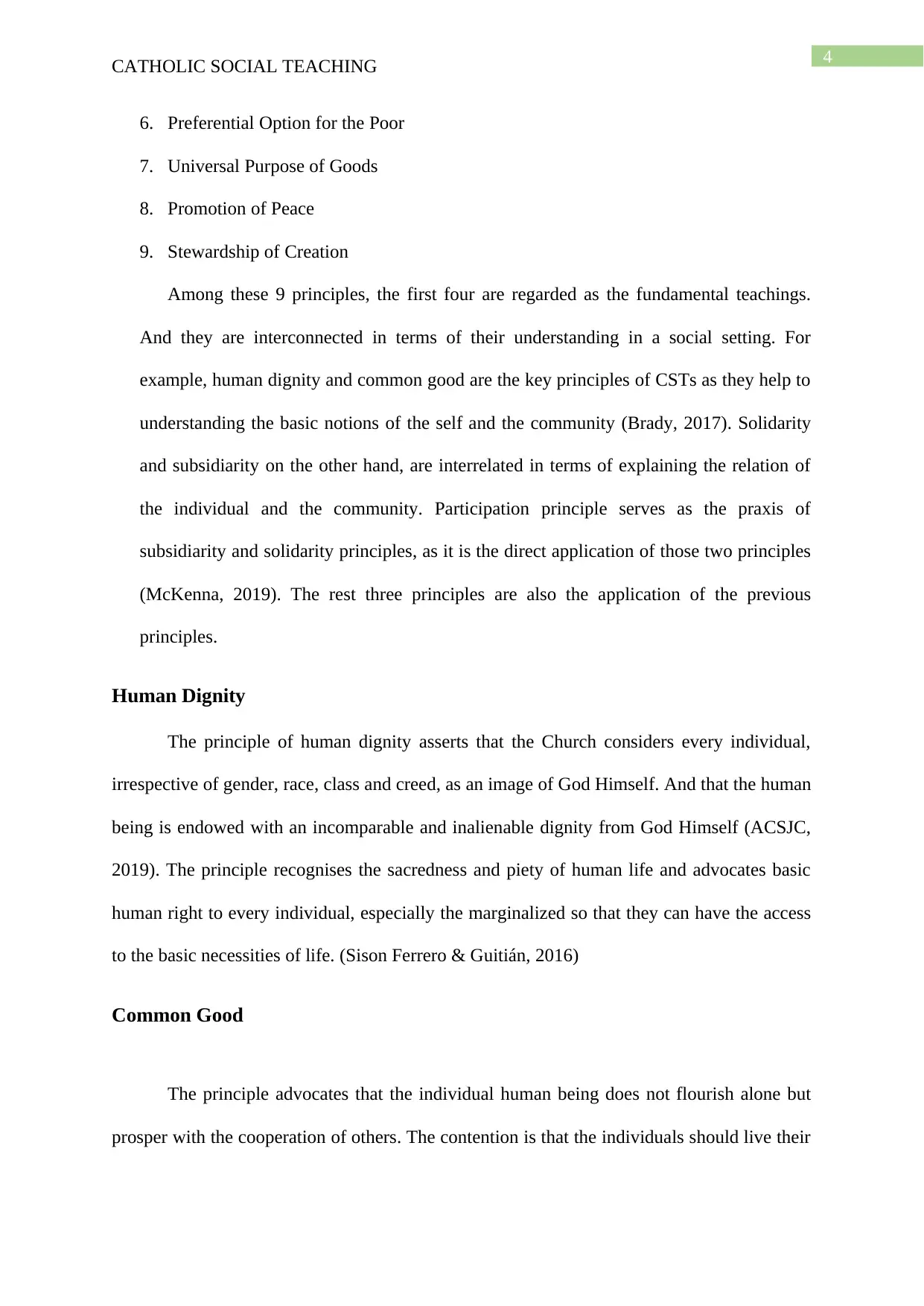
4
CATHOLIC SOCIAL TEACHING
6. Preferential Option for the Poor
7. Universal Purpose of Goods
8. Promotion of Peace
9. Stewardship of Creation
Among these 9 principles, the first four are regarded as the fundamental teachings.
And they are interconnected in terms of their understanding in a social setting. For
example, human dignity and common good are the key principles of CSTs as they help to
understanding the basic notions of the self and the community (Brady, 2017). Solidarity
and subsidiarity on the other hand, are interrelated in terms of explaining the relation of
the individual and the community. Participation principle serves as the praxis of
subsidiarity and solidarity principles, as it is the direct application of those two principles
(McKenna, 2019). The rest three principles are also the application of the previous
principles.
Human Dignity
The principle of human dignity asserts that the Church considers every individual,
irrespective of gender, race, class and creed, as an image of God Himself. And that the human
being is endowed with an incomparable and inalienable dignity from God Himself (ACSJC,
2019). The principle recognises the sacredness and piety of human life and advocates basic
human right to every individual, especially the marginalized so that they can have the access
to the basic necessities of life. (Sison Ferrero & Guitián, 2016)
Common Good
The principle advocates that the individual human being does not flourish alone but
prosper with the cooperation of others. The contention is that the individuals should live their
CATHOLIC SOCIAL TEACHING
6. Preferential Option for the Poor
7. Universal Purpose of Goods
8. Promotion of Peace
9. Stewardship of Creation
Among these 9 principles, the first four are regarded as the fundamental teachings.
And they are interconnected in terms of their understanding in a social setting. For
example, human dignity and common good are the key principles of CSTs as they help to
understanding the basic notions of the self and the community (Brady, 2017). Solidarity
and subsidiarity on the other hand, are interrelated in terms of explaining the relation of
the individual and the community. Participation principle serves as the praxis of
subsidiarity and solidarity principles, as it is the direct application of those two principles
(McKenna, 2019). The rest three principles are also the application of the previous
principles.
Human Dignity
The principle of human dignity asserts that the Church considers every individual,
irrespective of gender, race, class and creed, as an image of God Himself. And that the human
being is endowed with an incomparable and inalienable dignity from God Himself (ACSJC,
2019). The principle recognises the sacredness and piety of human life and advocates basic
human right to every individual, especially the marginalized so that they can have the access
to the basic necessities of life. (Sison Ferrero & Guitián, 2016)
Common Good
The principle advocates that the individual human being does not flourish alone but
prosper with the cooperation of others. The contention is that the individuals should live their
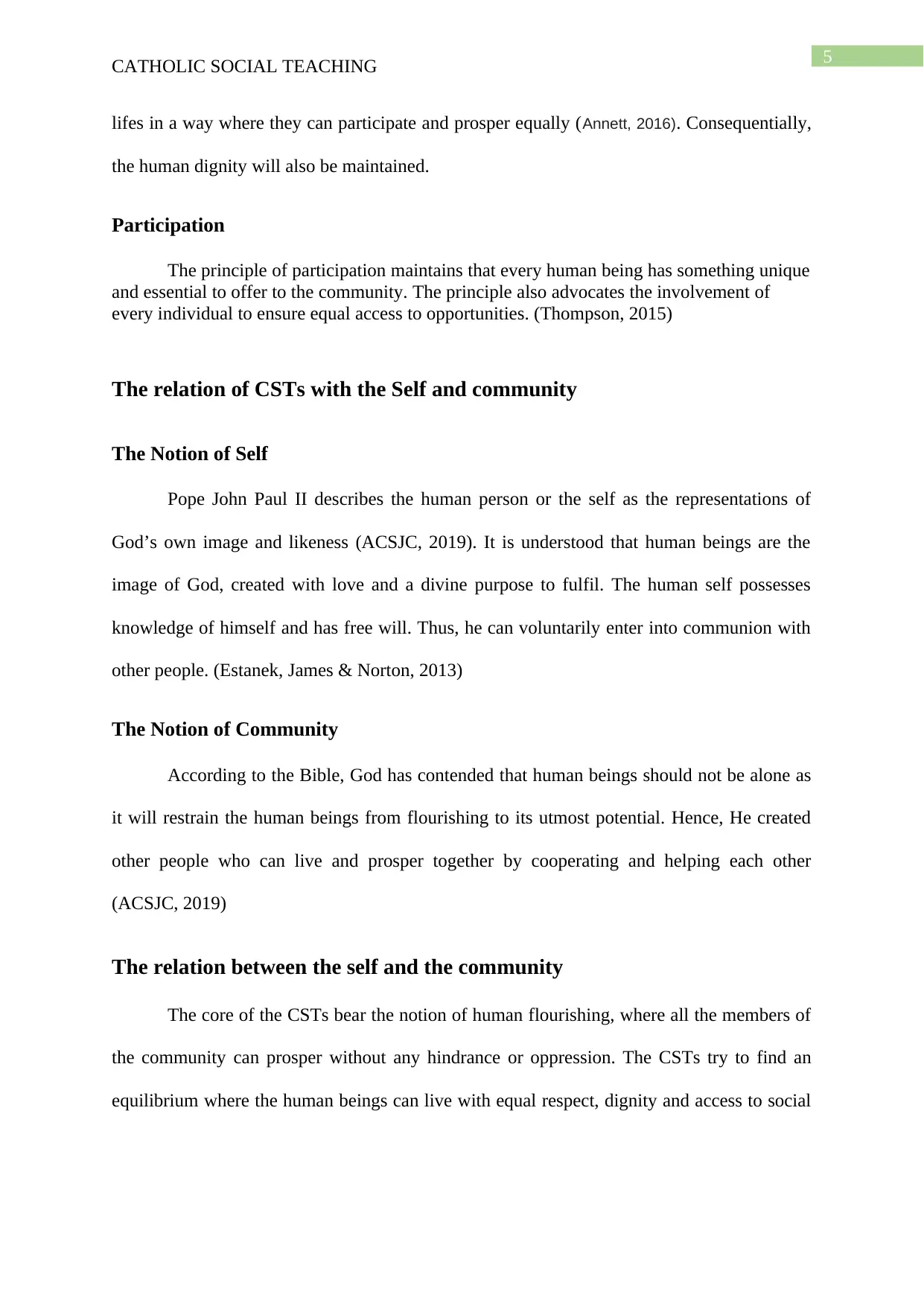
5
CATHOLIC SOCIAL TEACHING
lifes in a way where they can participate and prosper equally (Annett, 2016). Consequentially,
the human dignity will also be maintained.
Participation
The principle of participation maintains that every human being has something unique
and essential to offer to the community. The principle also advocates the involvement of
every individual to ensure equal access to opportunities. (Thompson, 2015)
The relation of CSTs with the Self and community
The Notion of Self
Pope John Paul II describes the human person or the self as the representations of
God’s own image and likeness (ACSJC, 2019). It is understood that human beings are the
image of God, created with love and a divine purpose to fulfil. The human self possesses
knowledge of himself and has free will. Thus, he can voluntarily enter into communion with
other people. (Estanek, James & Norton, 2013)
The Notion of Community
According to the Bible, God has contended that human beings should not be alone as
it will restrain the human beings from flourishing to its utmost potential. Hence, He created
other people who can live and prosper together by cooperating and helping each other
(ACSJC, 2019)
The relation between the self and the community
The core of the CSTs bear the notion of human flourishing, where all the members of
the community can prosper without any hindrance or oppression. The CSTs try to find an
equilibrium where the human beings can live with equal respect, dignity and access to social
CATHOLIC SOCIAL TEACHING
lifes in a way where they can participate and prosper equally (Annett, 2016). Consequentially,
the human dignity will also be maintained.
Participation
The principle of participation maintains that every human being has something unique
and essential to offer to the community. The principle also advocates the involvement of
every individual to ensure equal access to opportunities. (Thompson, 2015)
The relation of CSTs with the Self and community
The Notion of Self
Pope John Paul II describes the human person or the self as the representations of
God’s own image and likeness (ACSJC, 2019). It is understood that human beings are the
image of God, created with love and a divine purpose to fulfil. The human self possesses
knowledge of himself and has free will. Thus, he can voluntarily enter into communion with
other people. (Estanek, James & Norton, 2013)
The Notion of Community
According to the Bible, God has contended that human beings should not be alone as
it will restrain the human beings from flourishing to its utmost potential. Hence, He created
other people who can live and prosper together by cooperating and helping each other
(ACSJC, 2019)
The relation between the self and the community
The core of the CSTs bear the notion of human flourishing, where all the members of
the community can prosper without any hindrance or oppression. The CSTs try to find an
equilibrium where the human beings can live with equal respect, dignity and access to social
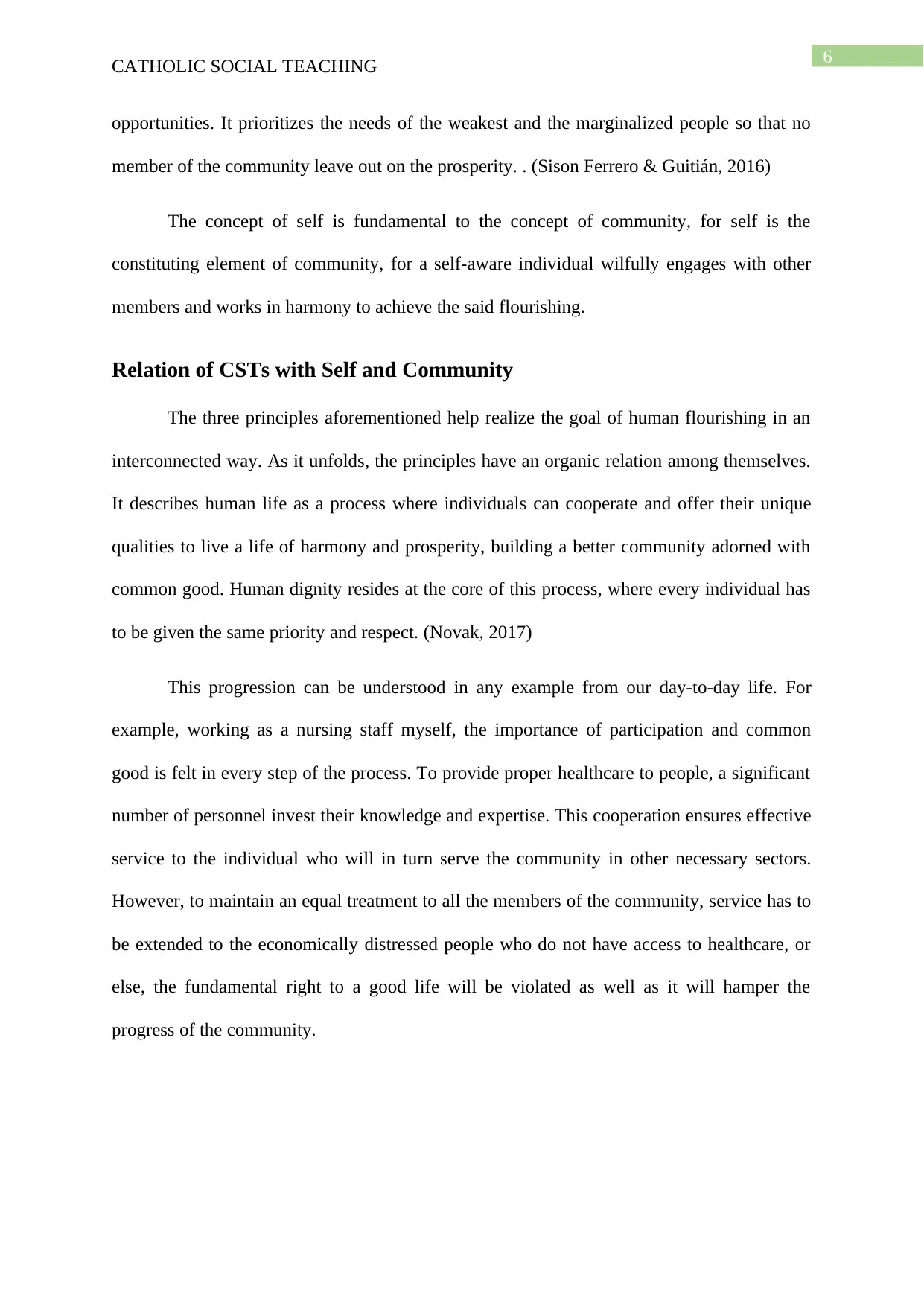
6
CATHOLIC SOCIAL TEACHING
opportunities. It prioritizes the needs of the weakest and the marginalized people so that no
member of the community leave out on the prosperity. . (Sison Ferrero & Guitián, 2016)
The concept of self is fundamental to the concept of community, for self is the
constituting element of community, for a self-aware individual wilfully engages with other
members and works in harmony to achieve the said flourishing.
Relation of CSTs with Self and Community
The three principles aforementioned help realize the goal of human flourishing in an
interconnected way. As it unfolds, the principles have an organic relation among themselves.
It describes human life as a process where individuals can cooperate and offer their unique
qualities to live a life of harmony and prosperity, building a better community adorned with
common good. Human dignity resides at the core of this process, where every individual has
to be given the same priority and respect. (Novak, 2017)
This progression can be understood in any example from our day-to-day life. For
example, working as a nursing staff myself, the importance of participation and common
good is felt in every step of the process. To provide proper healthcare to people, a significant
number of personnel invest their knowledge and expertise. This cooperation ensures effective
service to the individual who will in turn serve the community in other necessary sectors.
However, to maintain an equal treatment to all the members of the community, service has to
be extended to the economically distressed people who do not have access to healthcare, or
else, the fundamental right to a good life will be violated as well as it will hamper the
progress of the community.
CATHOLIC SOCIAL TEACHING
opportunities. It prioritizes the needs of the weakest and the marginalized people so that no
member of the community leave out on the prosperity. . (Sison Ferrero & Guitián, 2016)
The concept of self is fundamental to the concept of community, for self is the
constituting element of community, for a self-aware individual wilfully engages with other
members and works in harmony to achieve the said flourishing.
Relation of CSTs with Self and Community
The three principles aforementioned help realize the goal of human flourishing in an
interconnected way. As it unfolds, the principles have an organic relation among themselves.
It describes human life as a process where individuals can cooperate and offer their unique
qualities to live a life of harmony and prosperity, building a better community adorned with
common good. Human dignity resides at the core of this process, where every individual has
to be given the same priority and respect. (Novak, 2017)
This progression can be understood in any example from our day-to-day life. For
example, working as a nursing staff myself, the importance of participation and common
good is felt in every step of the process. To provide proper healthcare to people, a significant
number of personnel invest their knowledge and expertise. This cooperation ensures effective
service to the individual who will in turn serve the community in other necessary sectors.
However, to maintain an equal treatment to all the members of the community, service has to
be extended to the economically distressed people who do not have access to healthcare, or
else, the fundamental right to a good life will be violated as well as it will hamper the
progress of the community.
Paraphrase This Document
Need a fresh take? Get an instant paraphrase of this document with our AI Paraphraser
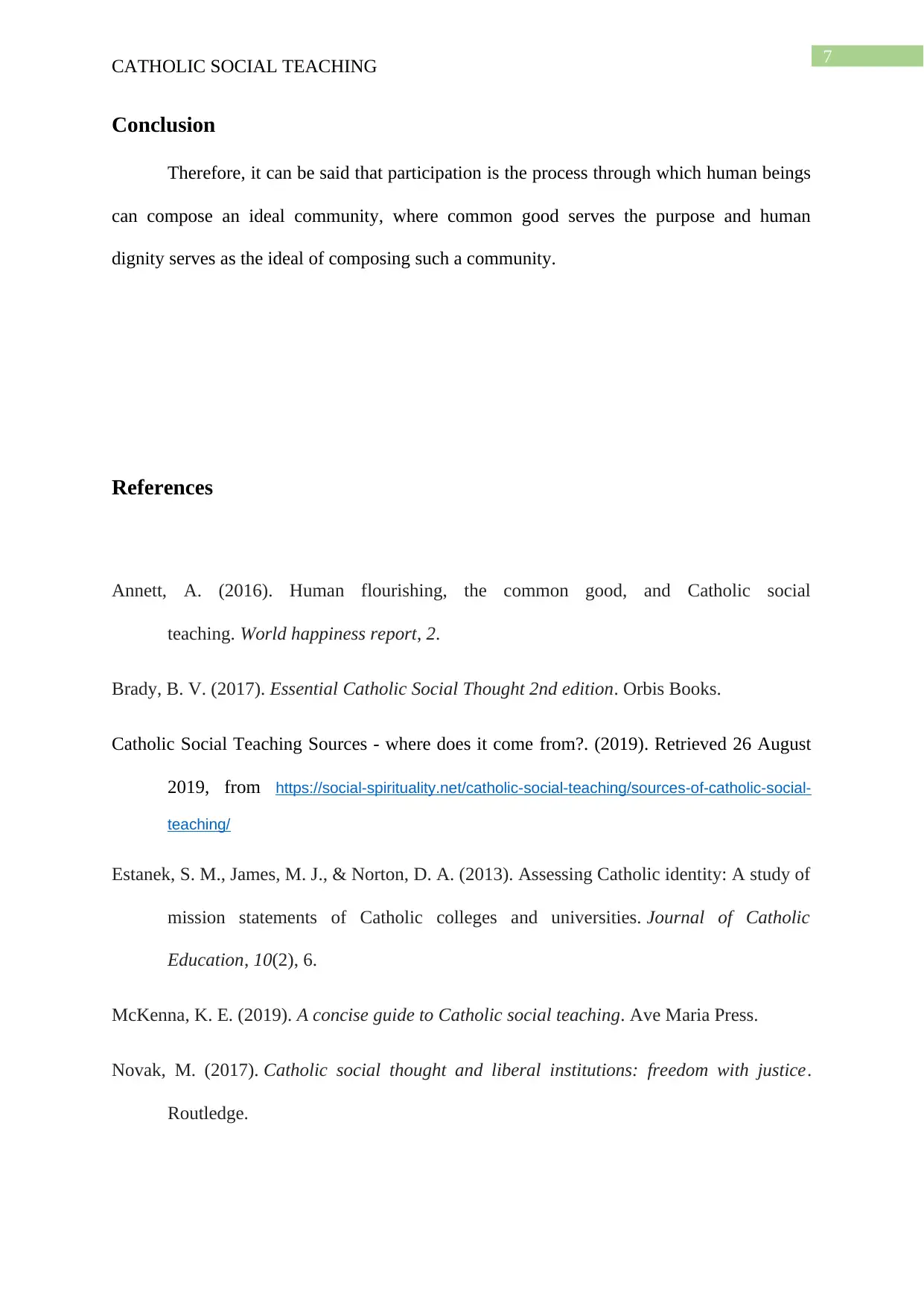
7
CATHOLIC SOCIAL TEACHING
Conclusion
Therefore, it can be said that participation is the process through which human beings
can compose an ideal community, where common good serves the purpose and human
dignity serves as the ideal of composing such a community.
References
Annett, A. (2016). Human flourishing, the common good, and Catholic social
teaching. World happiness report, 2.
Brady, B. V. (2017). Essential Catholic Social Thought 2nd edition. Orbis Books.
Catholic Social Teaching Sources - where does it come from?. (2019). Retrieved 26 August
2019, from https://social-spirituality.net/catholic-social-teaching/sources-of-catholic-social-
teaching/
Estanek, S. M., James, M. J., & Norton, D. A. (2013). Assessing Catholic identity: A study of
mission statements of Catholic colleges and universities. Journal of Catholic
Education, 10(2), 6.
McKenna, K. E. (2019). A concise guide to Catholic social teaching. Ave Maria Press.
Novak, M. (2017). Catholic social thought and liberal institutions: freedom with justice.
Routledge.
CATHOLIC SOCIAL TEACHING
Conclusion
Therefore, it can be said that participation is the process through which human beings
can compose an ideal community, where common good serves the purpose and human
dignity serves as the ideal of composing such a community.
References
Annett, A. (2016). Human flourishing, the common good, and Catholic social
teaching. World happiness report, 2.
Brady, B. V. (2017). Essential Catholic Social Thought 2nd edition. Orbis Books.
Catholic Social Teaching Sources - where does it come from?. (2019). Retrieved 26 August
2019, from https://social-spirituality.net/catholic-social-teaching/sources-of-catholic-social-
teaching/
Estanek, S. M., James, M. J., & Norton, D. A. (2013). Assessing Catholic identity: A study of
mission statements of Catholic colleges and universities. Journal of Catholic
Education, 10(2), 6.
McKenna, K. E. (2019). A concise guide to Catholic social teaching. Ave Maria Press.
Novak, M. (2017). Catholic social thought and liberal institutions: freedom with justice.
Routledge.
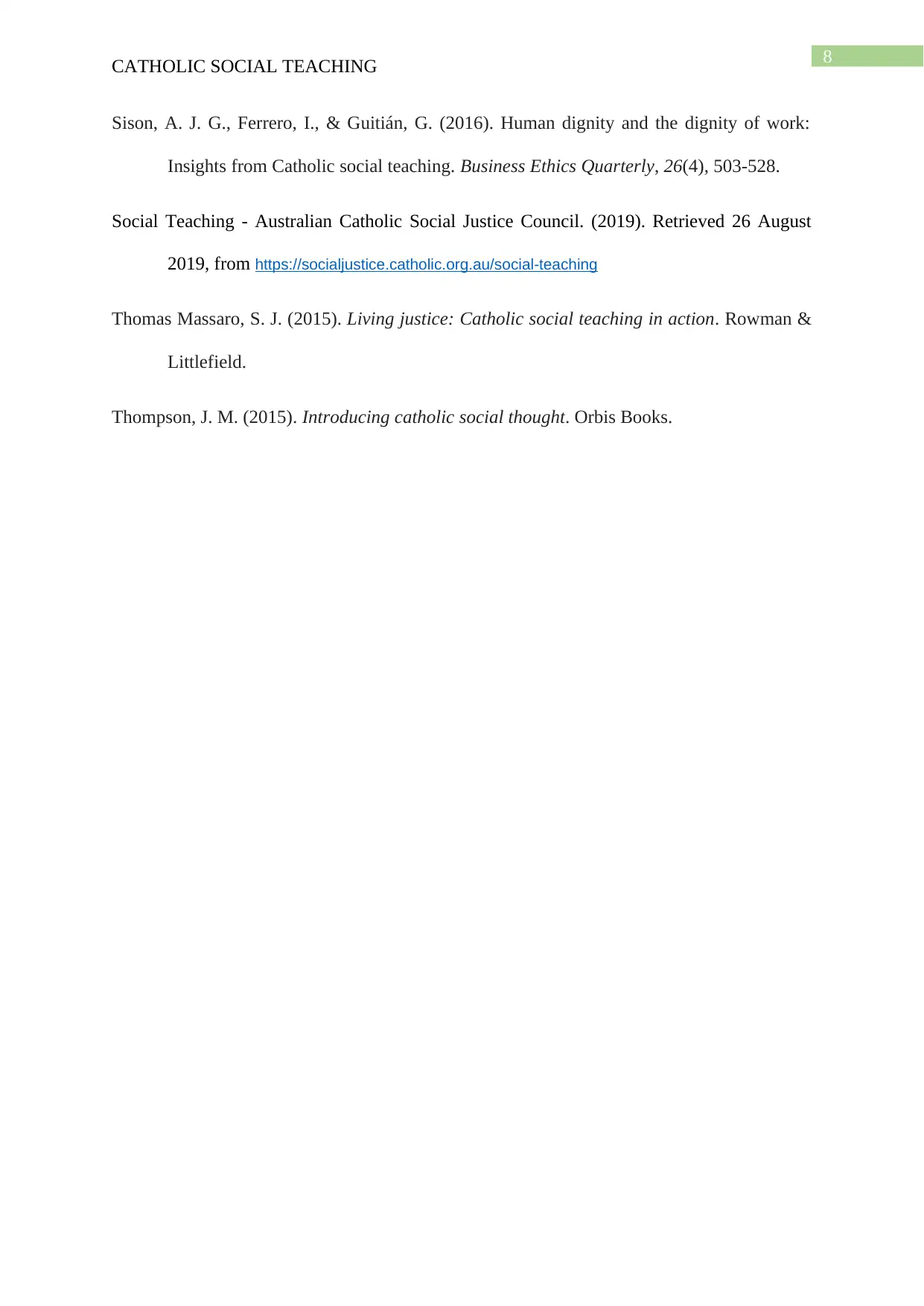
8
CATHOLIC SOCIAL TEACHING
Sison, A. J. G., Ferrero, I., & Guitián, G. (2016). Human dignity and the dignity of work:
Insights from Catholic social teaching. Business Ethics Quarterly, 26(4), 503-528.
Social Teaching - Australian Catholic Social Justice Council. (2019). Retrieved 26 August
2019, from https://socialjustice.catholic.org.au/social-teaching
Thomas Massaro, S. J. (2015). Living justice: Catholic social teaching in action. Rowman &
Littlefield.
Thompson, J. M. (2015). Introducing catholic social thought. Orbis Books.
CATHOLIC SOCIAL TEACHING
Sison, A. J. G., Ferrero, I., & Guitián, G. (2016). Human dignity and the dignity of work:
Insights from Catholic social teaching. Business Ethics Quarterly, 26(4), 503-528.
Social Teaching - Australian Catholic Social Justice Council. (2019). Retrieved 26 August
2019, from https://socialjustice.catholic.org.au/social-teaching
Thomas Massaro, S. J. (2015). Living justice: Catholic social teaching in action. Rowman &
Littlefield.
Thompson, J. M. (2015). Introducing catholic social thought. Orbis Books.
1 out of 9
Related Documents
Your All-in-One AI-Powered Toolkit for Academic Success.
+13062052269
info@desklib.com
Available 24*7 on WhatsApp / Email
![[object Object]](/_next/static/media/star-bottom.7253800d.svg)
Unlock your academic potential
© 2024 | Zucol Services PVT LTD | All rights reserved.



